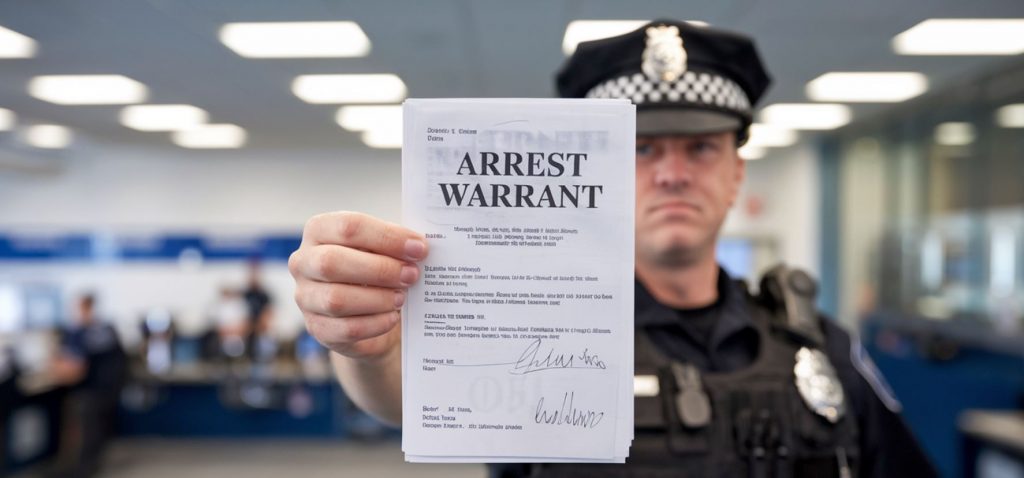It is Generally Best to Self-Surender with a Criminal Defense Attorney by Your Side
If you know a warrant is outstanding for you, it will never go away. However, hiring an attorney for a warrant would be better than turning yourself in at a court or the police station without counsel.

Warrants Never Go Away
Only a court order will cancel a warrant once a judge enters it into the LEIN system (Law Enforcement Information Network). A judge is the only person authorized to take a warrant out of LEIN because a judge is the one who put it there in the first place. Hiring an attorney and self-surrendering is much better than getting caught by the police or turning yourself in while unrepresented. If you voluntarily surrender on a warrant with a retained, respected criminal defense attorney, you have an excellent chance of walking out of the courtroom instead of being arrested and detained.
“If I failed to appear in court, should I get an attorney to help with the warrant?”
Failure to Appear Warrant – When a person fails to appear in court, it is considered contempt of court. The legal system would fall apart if defendants never appeared in court. If that happened, people would have to take all matters into their own hands, and violence would eventually ensue. Society decided that court appearances are mandatory and created the “warrant” to permit arrests by law enforcement officials.
A judge can hold someone in contempt if law enforcement officers arrest them on a fugitive warrant. Contempt can result in a jail sentence or excessive fines. If the police arrest a person and the judge believes the arrestee was aware of the warrant, they will soon be face-to-face with a judge feeling challenged and insulted, which is not an appealing circumstance. The judge will set a bond typically high enough to ensure the defendant remains in custody until their court date. The judge will want to make sure the arrestee appears, and it will seem that that person cannot be trusted to appear.
“A warrant was issued for my arrest. Is it best to get an attorney to help with the warrant?”
Arrest Warrant – If the police obtained an arrest warrant and the defendant is unaware, officers might arrest them at any time. If police officers arrest someone, the judge will arraign them they are in custody. If you know of a warrant and plan to plead ignorance, that losing strategy can result in your long-term incarceration. Merely “hoping for the best” is a risky and typically losing strategy. When you know that you are under investigation, it is best to hire reputable counsel immediately so that they can determine if you are subject to arrest.
Your best strategy to stay out of jail is to be proactive.
Suppose someone accuses you of illegal activity, and the police are investigating the allegation. In that case, your best strategy is to immediately retain an expert criminal defense attorney to see if there is an outstanding warrant. If you look into it on your own, the first thing a police officer will say is they want to talk to you and get “your side of the story.” This type of manipulative trickery is a common ploy used to obtain statements for evidence in court. It is never, under any circumstances, wise to talk to the police yourself.
An attorney can find out if there is an outstanding warrant for your arrest, contact the officer in charge of your case, and file an appearance with the court that issued the warrant. If an attorney files an appearance, the court will generally take the warrant out of the system because the court knows you will appear; otherwise, you would not have wasted your money hiring an attorney.

What if I didn’t know there was a warrant out for me?
Of course, there are times when people honestly have no idea they have a warrant out for them. A warrant can be issued for a person’s arrest without their knowledge when someone with a sinister motive, such as revenge, alleges false charges. For example, many domestic violence cases result from untruthful or exaggerated allegations of an ex-boyfriend or girlfriend after a painful breakup or by a former spouse to gain an advantage in divorce proceedings. If you were unaware of the charges, your attorney could show the judge that you did not know there was a warrant for your arrest. Your lack of awareness is even more likely when you are completely innocent; the party who led the police to obtain the warrant had an illegal motive and lied to the police. Showing some evidence that the complainant had an improper motive may result in a successful disposition in court.
Frequently Asked Questions
What’s the best time to turn yourself in?
Your attorney must coordinate with the police department or court before you surrender yourself on a warrant. Some courts handle arraignments in the morning, and others do them in the afternoon. Turning yourself into the court or police department at the wrong time can result in unnecessarily prolonged time in custody. An experienced attorney will know the particulars of the court and help you minimize or avoid time in custody.
How do I deal with a warrant in Michigan?
It is best to deal with a warrant as soon as possible to avoid an unnecessary arrest and time in jail. Do not turn yourself in on a warrant without a lawyer! If you are unrepresented, it can take a couple of days before the arraignment, and the judge will be less inclined to grant a low or personal bond.
How long do warrants last in Michigan?
In Michigan, felony and misdemeanor warrants never expire and last forever. A warrant remains in the system until a judge orders its removal or dismissal.
How do you check for warrants in Michigan?
It can be challenging to determine if you have a warrant. If you check your criminal history with the Michigan State Police, that record might contain information regarding an outstanding warrant. Otherwise, your lawyer might have to check directly with police departments or courts to get warrant information.
How do you get a warrant lifted in Michigan?
The court will only lift most warrants if the defendant personally appears for an arraignment hearing. Under limited circumstances, a criminal defense lawyer can enter their appearance (a document stating a defendant has hired them) with the court and request the dismissal of the warrant. If a defendant cannot personally appear, the lawyer can file a motion with the court and seek an accommodation from the presiding judge.
What does surrender to the court mean?
Surrendering to the court means walking into the court and presenting oneself for arraignment on a warrant. Most courts have set times for arraignment, so it is vital to only appear at the appropriate time.
What is a voluntary surrender?
Voluntary surrender means turning oneself in at the court or police station voluntarily. It is advisable to make arrangements with the court or police department for a voluntary surrender time to minimize the time in custody. A judge or magistrate will be inclined to grant a low or personal bond for someone who voluntarily surrenders.
How do I get rid of a warrant in Michigan?
The two options for getting rid of a warrant are (1) to turn yourself in at the issuing court or police department or (2) to hire a lawyer. If you hire an attorney, they can get the clerk to cancel the warrant or make arrangements for you to surrender and get a low or a personal bond.
How long does a misdemeanor warrant stay active in Michigan?
Misdemeanor warrants never expire and stay in the National Crime Information Center (NCIC) until canceled by a court. The only way to get a warrant canceled is a court arraignment or a motion to set aside or dismiss it.
What is a bench warrant in MI?
A bench warrant is an arrest warrant signed by a judge for a defendant who fails to appear in court for a scheduled hearing.
How do I deal with a warrant in Michigan?
It is best not to deal with a warrant on your own. If a court issues a warrant for your arrest, it is best to hire a reputable, skilled criminal defense lawyer as soon as possible to assist you and get it canceled.
How do I clear a warrant in Michigan?
The only way to clear a warrant is to get it set aside or canceled by the issuing court. Your options are to self-surrender or hire legal counsel.

Premier Criminal Defense Attorneys for Addressing Outstanding Warrants
The top-rated attorneys at LEWIS & DICKSTEIN, P.L.L.C. have successfully and proactively helped clients turn themselves in on outstanding warrants for decades in Wayne, Oakland, Macomb, Washtenaw, and Livingston counties and throughout Michigan, as well as in federal courts. We know all aspects of the process and have many astute strategies to address every circumstance. Our attorneys will make the process as painless as possible and protect you every step of the way. Our attorneys will act on your behalf tenaciously to obtain the best result possible.
Give us a call for a free consultation, and one of our expert attorneys will take the time to explain the process, answer all of your questions, and devise a strategy to make things right with the court. We will find a way to help you!
Call us today at (248) 263-6800 for a free consultation or complete an online Request for Assistance Form. We will contact you promptly and find a way to help you.












